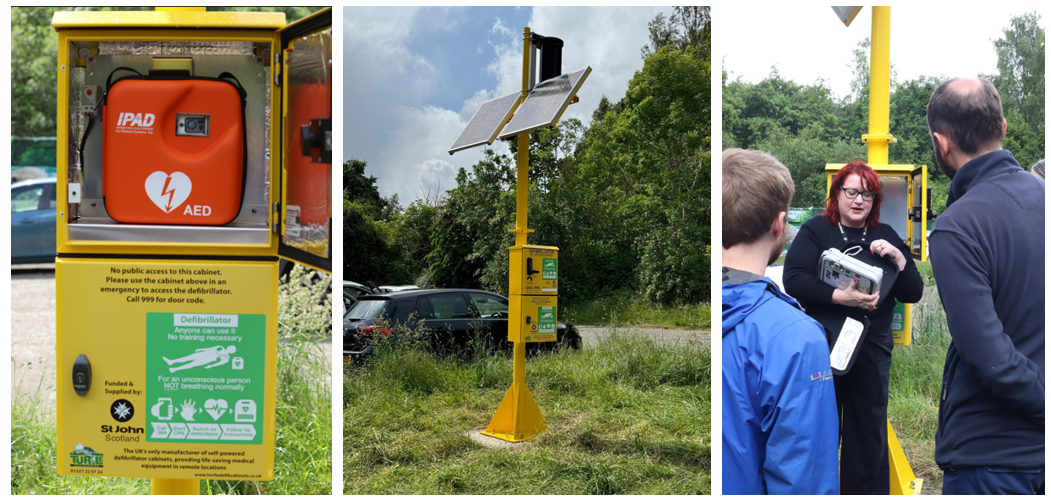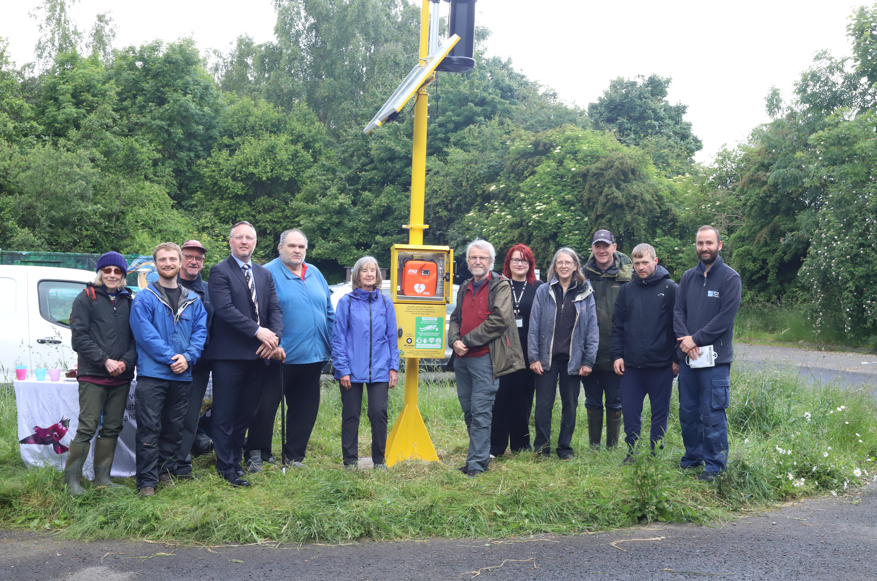Innovative Solar and Wind-Powered Defibrillator Installed at RSPB Baron’s Haugh Nature Reserve
St John Scotland, in partnership with the Royal Society for the Protection of Birds (RSPB), is proud to announce the installation of a pioneering Public Access Defibrillator (PAD) at the RSPB Baron’s Haugh Nature Reserve in Motherwell. The unveiling of the defibrillator took place on the 5th of June 2024. This significant development marks the first solar and wind-powered PAD installation in Scotland, aimed at enhancing public safety in a remote and power-deprived location. In Scotland the advantages would be ground-breaking. Research showed that solar alone was not enough to support a heating system for the defibrillator in winter, which is why both solar and wind is required.
The installation of this defibrillator is not just a technological advancement but a deeply meaningful tribute to Stephen Owen, who managed the nature reserve between 2012 and 2016 and sadly passed away from cardiac arrest in 2017, and Karen Galloway, who passed away from cardiac arrest in 2023 and was the wife of volunteer Andrew who has given up his time for over a decade to protect this special place. Both have left a profound impact on the community. The project emerged from a conversation about defibrillator accessibility at other RSPB reserves, leading to the idea of placing a PAD at Baron’s Haugh, despite the challenge of no existing electricity supply.
Recognising the necessity of defibrillators in saving lives during cardiac emergencies, St John Scotland, with financial backing and logistical support from their partners, took on this project. Deborah McKinnon, St John Scotland's Delivery Officer, collaborated with the RSPB Scotland and Turtle Engineering to overcome the power supply issue by incorporating innovative solar and wind technology. This approach ensures the defibrillator remains operational in all weather conditions, safeguarding against the potential damage caused by cold temperatures.
Turtle, based in Rugby, England, travelled to Motherwell to install the cabinet, while WelMedical generously donated the defibrillator itself. St John Scotland member Liam Hackett CStJ played a crucial role in raising additional funds for the project. The official unveiling ceremony was attended by representatives from St John Scotland, RSPB Scotland, and Stephen and Karen’s families.
In Scotland, approximately 70 individuals suffer a cardiac arrest weekly, with survival rates currently at one in ten. St John Scotland, in partnership with Save a Life for Scotland (SALFS), is committed to improving these statistics by supplying PADs and offering free CPR and defibrillator awareness sessions. The Baron’s Haugh installation reflects this mission, with planned awareness sessions for the local community, RSPB Scotland staff, volunteers, and visitors to ensure everyone is prepared in the event of a cardiac emergency.
The renewable energy-powered defibrillator stands as a symbol of Stephen and Karen’s legacies and a testament to the seamless integration of innovation and conservation. It highlights St John Scotland’s dedication to safety while preserving the natural beauty and biodiversity of Baron’s Haugh—a cause Stephen and Karen were both deeply passionate about.
This collaborative effort between RSPB Scotland and St John Scotland not only commemorates Stephen and Karen but also sets a precedent for future projects at other nature reserves and remote locations. The success of this initiative underscores the potential of renewable energy in life-saving technology and the importance of community-driven solutions in protecting both people and wildlife.
Barri Millar, the newly appointed Chief Operating Officer for St John Scotland said, "I am delighted that St John Scotland were able to support this installation, and the new innovative solution to the problem of remote sites with no power has now been resolved and advanced the ability to deploy and install public access defibrillators throughout the country. Although more costly to install, we would love to work with other community groups to find solutions to installing public access defibrillators in remote locations, and ultimately save lives.’’
Deborah McKinnon said: “I am incredibly excited and inspired by this project. It's thrilling to see St John Scotland introduce innovative technology that can help save lives, even in Scotland’s most remote areas. Knowing that the absence of an electricity supply no longer hinders our ability to safeguard our communities is truly reassuring. Coupled with our free CPR and defibrillator awareness sessions, this initiative empowers our communities to unite and take care of one another.”
Dr Gareth Clegg, Consultant in Emergency Medicine, Group Lead for the Resuscitation Research Group, and Save a Life for Scotland(SALFS) was delighted to see an innovative way to provide power to a defib cabinet. He said "St John Scotland are a valued partner of SALFS and we are delighted to see St John Scotland leading the way in supporting rural communities to save lives.’’
David Anderson, RSPB Scotland Warden at Baron’s Haugh, said: “Stephen and Karen are both very special people for RSPB Baron’s Haugh. Stephen’s kindness and warmth is still talked about by people who knew him, and he made a huge contribution to protecting this nature reserve. We also want to recognise the contribution of Karen’s family who dedicated their time to protecting Baron’s Haugh over the past decade. I hope we never have to use this defibrillator, but it is such a comfort to know it is there and ready to be used by anyone who needs to help in an emergency situation.”
Stephen’s family said: “We are very moved by the RSPB and St John Scotland including a memorial to Stephen in the installation of the defibrillator and to know that he is still remembered fondly from his time working at Baron’s Haugh. The innovative use of renewable energy to power the heating system for the defibrillator is particularly appropriate given Stephen’s dedication to environmental issues.”

